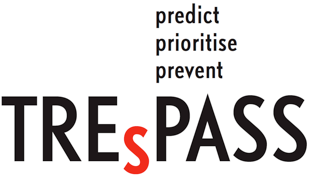TREsPASS - Technology-supported Risk Estimation by Predictive Assessment of Socio-technical Security
Information security threats to organisations have changed completely over the last decade, due to the complexity and dynamic nature of infrastructures and attacks. Successful attacks cost society billions a year, impacting vital services and the economy. New attacks cleverly exploit multiple organisational vulnerabilities, involving physical security and human behaviour. Defenders need to make rapid decisions regarding which attacks to block, as both infrastructure and attacker knowledge change rapidly.
Current risk management methods provide descriptive tools for assessing threats by systematic brainstorming. Attack opportunities will be identified and prevented only if people can conceive them. In today’s dynamic attack landscape, this process is too slow and exceeds the limits of human imaginative capability. Emerging security risks demand tool support to predict, prioritise, and prevent complex attacks systematically.
The TREsPASS project will make this possible, by building an “attack navigator”. This navigator makes it possible to say which attack opportunities are possible, which of them are the most urgent, and which countermeasures are most effective. To this end, the project combines knowledge from technical sciences (how vulnerable are protocols and software), social sciences (how likely are people to succumb to social engineering), and state-of-the-art industry processes and tools.
By integrating European expertise on socio-technical security into a widely applicable and standardised framework, TREsPASS will reduce security incidents in Europe, and allow organisations and their customers to make informed decisions about security investments. This increased resilience of European businesses both large and small is vital to safeguarding the social and economic prospects of Europe.

